- Home
- Roxane Gay
Difficult Women Page 18
Difficult Women Read online
Page 18
His cheeks reddened and he looked down, to the side. I pressed my lips to his throat. His pulse throbbed against me, the artery thick and hot, the power of his sun. Joshua reached into his pocket and pulled out a dark gray box similar to the one he had given me twelve years earlier, narrower, thicker. His hands trembled harder. I held his wrists and pulled him closer. When he tried to speak, he only stuttered, his words twisting themselves into complicated knots.
I slid out of my seat and rested my cheek against his chest, hard and soft at the same time. The beating of his heart was so fast and loud it terrified me but I knew I could trust his heart. “Shhh,” I said. I took the box from him and set it on my chair. I stood on the tips of my toes, brushing my lips against his ear before grabbing the fleshy lobe between my teeth. He tasted like sweet spice. Joshua’s hands found the small of my back like they always do, locking against the base of my spine. We stood like that for a long while, his breath falling against the top of my head, my breath falling against his chest. The beating of his heart slowed.
“What do you mean to say to me, Joshua Hightower?”
He inhaled deeply, like he was trying to pull all the air in the domed room into his body. “I mean to marry you.”
“Are you going to be good to me?”
His brow furrowed as he nodded. “How could you ask that?”
I traced his lower lip with my thumb. “Promise me you won’t do something that would take you away from me or that would change the world as we know it now.”
Joshua fell slackly against me. I gasped but held the weight of him. We are both strong. “I am not my father,” he finally said. “My father was a good man. I aim to be better.”
“I’m glad you knew the question didn’t need asking. I mean to marry you, too.”
Joshua reached behind me and opened the box. He held my hand as if my bones were the most delicate things. He slid a beautiful ring onto my finger, the platinum of it cool and solid, an anchor, the diamond bright like the moon and what once was the sun. I had no idea where he got it from but I knew not to ask. Men need their secrets.
We fell to our knees. I slid my hands beneath his shirt, heavy cotton, my palms against muscle sharply carved, the bones of his rib cage. I pulled his shirt over his head and he did the same with mine. I stretched out on the floor of the observatory and he pressed a button. The dome slowly creaked open and I stared past the blue shadow of his body over mine, up into the stars, up into that bright, bright light of night. I dug my fingernails into the tightly stretched skin across his back as he filled me and moved over and through me and meshed his lips with mine. We crushed our teeth together. We were loud and wet and sloppy. I held Joshua deep inside but I never stopped looking at the stars. The pleasure took me all the way over. I cried. He licked my tears with the flat of his tongue. I said, “It is always you.”
Soon after that night, the councils started to disband. Obsession lasts only if it can feed. Most people, still angry, still cold, still lonely for the sun, stopped caring as much about turning themselves inside out for something impossible. Enough blood had been spilled, and there were few Hightowers left. It is easy to become accustomed to darkness and chill. If you bear it long enough, you can become accustomed to almost anything. Embrace the cold and dark—that’s what we did. We learned to love the different kind of light at night, the pale blue of it. In the moonlight, the world felt purer. Making peace with the world and its black days was the only way to find any kind of happiness. What we all wanted even more than the sun was a little peace to hold in our hands and hearts.
My husband and I married on the lawn outside the observatory, in the middle of the night. My parents and his mother and a preacher stood with us. I wore the pink ribbon, mostly worn to a thin shine, braided through my hair and a long white dress, no sleeves, a dress that swirled around my legs when I walked. Joshua wore his best suit, a fine cut with clean lines. We exchanged promises that were long ago made, however unspoken, and have always been kept.
IV.
There was a new life between us. I felt that tiny, unknowable creature stirring in my womb from the beginning.
I told Joshua while soaking in the bathtub, the morning after a long night of work, the water still scorching hot. Bathing was one of the few things that made my skin remember the sun. I was red and tender and soft. My husband stood in the bathroom doorway, filling the frame from side to side, nearly from floor to ceiling. He smiled, said something that made my cheeks burn, my thighs tense. When he smiles at me, I am all lit up inside, like I am standing in the whitest heat. I remember what it felt like, when I was a girl, to lie out in the sum, feel that holy warmth on my skin. I cocked my head to the side and dragged my hand across the surface of the water. It rippled in light waves. Joshua shivered, stepped out of his worn shoes, and then his clothes, setting them in a neat pile in the hall. As he sank into the water across from me he sighed, smiled again, and I felt hotter still. I tapped my toe against his chin and he pressed his cheek, then his lips, against the wrinkled bottom of my foot. My hair clung to my face as steam rose around us. We stared at each other for a long while. I never tire of looking into his face.
“You are too quiet,” he finally said.
I curled my finger, beckoning him closer. Joshua slid through the water, some of it splashing onto the tiled floor. He floated in front of me, his forehead near my chin as he looked up, eagerly. I cupped his chin, squeezing. I breathed deeply. There was a strange tightness in my chest, like my body was trying to hold on to my secret a little longer.
Joshua nuzzled my neck. “Talk to me. What do you mean to say?”
“We have made us a child,” I said, softly.
He knelt, spilling more water out of the tub. He is a quiet man, but on that night, there was no limit to his expressions of joy. I felt freer and lighter once I forced the words out of my mouth. We talked of how we would love our child, how we already loved our child. We laughed and laughed, our voices rising through the small room. When we emerged from the cooling water, my husband wrapped me in a soft towel and carried me to our bed. We made love. We were not gentle but we were gentle. He fell asleep inside me. The next morning, I woke feeling his eyes on me. He tucked his hand beneath my breasts and said, “We must keep this between us for as long as we can.” We grew even closer, even stronger because we shared this perfect, desperate secret.
My husband and I tried to hide the growing swell of my belly as long as we could. We kept to ourselves more than ever. The townspeople would not welcome a single moment of happiness from anyone sharing the blood of Hiram Hightower. Though the councils had mostly disbanded, fringe elements lingered. When a crazy notion gets in a man’s head, there’s not much that will disabuse him of it. Joshua’s father taught us that. We learned the lesson well.
When we walked in town, in the dark of day, it was difficult to contain the sharp line of joy binding us even more tightly together. No darkness could hide that. Joshua held me close, his fingers gripping my arm tightly. If a man or woman looked at me too long, with unkind eyes, Joshua bared his teeth. We held our heads high. We took strong steps. We kept our secret until one afternoon, while we were laughing and practically skipping along the wooden sidewalks the way we did when we were children, a man we did not know, a man sitting in front of Kershbaum Mercantile & Dry Goods, stretched his leg out in front of me. “Son of a sun stealer,” he hissed. He ought to have been ashamed of himself, a grown man speaking a child’s taunt. I didn’t see the petty cruelty coming. I fell hard, could feel where bruises would form on my knees and thighs, elsewhere. As I fell, I stared at Joshua with wide-open eyes, reached for him, but even though we tried our fingers never quite met. I thought, My baby, my baby, my baby, but everything happened too fast for me to think clearly beyond the terrible understanding of what we might lose. I hit the ground, slick with frost, and held my arms over my stomach. Everything ached and it hurt to breathe and there was a tight cramping between my thighs. I tried to stand but fell
again, this time hitting my head. The world blurred.
Joshua’s rage, the rage he carried quietly for so many years, the rage of losing his father and the disappearance of the sun and standing before the Corona as he offered up his blood, the rage of living the whole of his life in a place where everyone blamed him for the darkness, that rage split wide open and spilled into the frost-lined street, and through the cracks in the wooden planks below us. Joshua reached up and grabbed a long, clear icicle hanging from an eave. He lunged at that petty man, holding the tip of the icicle against the man’s neck. I called my husband’s name and he stopped. He threw the icicle to the ground, where it splintered into a hundred pieces. If there had been sun, there would have been hundreds of tiny prisms of light. His hands shaking, red and probably numb, Joshua grabbed that man from where he sat, that man’s lips curling into an ugly smile. Joshua lifted that small, unfortunate man high into the air and shook him like he was trying to make the man into someone better. “She’s pregnant!” my husband shouted. “How dare you?” The man paled, looked real sickly as he tried to withstand the forceful heat of Joshua’s rage. I tried to focus, stretched my arm, pressing my fingers against Joshua’s ankle. “We need you,” I said so quietly I worried he wouldn’t hear me. Joshua released his grip on the man, who ran away, stumbling from side to side, leaving the sharp stench of urine in his wake.
My husband lifted me into his arms and ran three blocks to the infirmary. I hid my face in his chest, shivering. I said, “I am so cold.” I said, “Don’t let anything happen to me.” Joshua kicked the infirmary door open and placed me gently on an examination table. He covered me with thick blankets. He held my hands. The ache settled deeper into my bones. I went limp as the doctor pulled a bright light over my body. I was so drowsy. I sank into a sleep that wasn’t really sleep.
Sometime later, nearly two days, I opened my eyes to a room with white walls and a long window and beyond that a dark afternoon sky. I closed my eyes again, sighed, holding my hands against my belly. I smiled and remembered a lovely walk with my husband before a hard fall to the merciless ground. I thought, Finally, this is the price we pay. I sat up, stiffly. The deep bone ache returned. I rolled onto my side, slowly, and saw Joshua, his large body sprawled in a tiny chair or a chair that seemed tiny beneath his bulky frame. I reached for him, brushing my fingertips across his knee. He shot up and stepped closer to me, pushing my hair away from my face. He cupped my cheeks and kissed my forehead and my nose and my forehead and my nose. He smiled and I saw he had locked his rage back inside him and that maybe his rage was taking up less room in his chest now that some of it had been let out. When I tried to speak, he pressed a finger to my lips. “You’re fine. Our child is fine,” he said. I blinked, was falling asleep again now that I knew our private, joyful world would not end. I slid over a bit and touched the empty space next to me. I listened as Joshua stepped out of his shoes and climbed into the bed with me. He covered my hand with his. We held our baby together.
As we left the infirmary, passersby stared but no one dared approach us or speak an unkind word into the air surrounding us. Their rage made the air colder, thinner. After the sun disappeared, everyone harbored some kind of rage. It couldn’t be helped. The truth of it was that Joshua and I felt real sorrow for what everyone lost but after so many years, we no longer had the strength to carry it with us. We left the infirmary and picked up fresh bread, some fruit, and wine and then we went home, to our little piece of the world where we were safe, where our child was safe, where happiness was safe. The sun wasn’t ever coming back. There was no sacrifice, no blood to be spilled that would make right what Hiram Hightower had undone. If the price for the rising of the sun was the blood of our child, we would continue to learn to celebrate the darkness.
V.
Our daughter was born in the brightest space of the night, early in the new year. We named her Dawn. Upon hearing of her birth, for we were watched, the Corona convened, but because she was a girl, they decreed she would be spared.
They had no say in the matter, none at all.
The morning after Dawn was born, we sat with her on the deck Joshua built. In the farthest corner of the sky, we could see a light spread of gray where once there had been nothing but the black memory of the sun. The air was a little warmer. It was strange. Joshua stood and held our child up to this gray glow and even though we doubted she could understand us, we told her about days when the sun burned so bright it darkened our skin and covered the world in light.
We always knew we would not hide our child from the world. Such joy could not be contained. On lazy afternoons, we drove into town and walked beneath the flickering gaslights, inhaling their sweet, sweet smell. We reveled in the darkness covering us, holding on to the carriage handle tightly, smiling easily as Dawn spoke to us in the intimate language we tried so hard to understand.
When Dawn turned nine months old, she and I stood on the edge of what was once a lake but in the absence of the sun became a lesser body of water. The light spread of gray had brightened into a pale white. We could walk outside without coats or sweaters, some days. No one, not anywhere, dared to speak of the black memory of sun that had become something brighter. That day at the lake, Joshua walked along the dusty shore, his arms out at his sides, grinning, doing a silly dance. Dawn and I waved to him and sang to him. Farther along the shore, there were other families, enjoying the cool, clear day. I kissed the baby’s forehead and whispered the secret words of mothers into the soft skin of her face.
A woman walked up to me, not much older than I, a woman who had, like me, known the warmth of the sun as a young girl. She was thin and pale and seemed unfamiliar with joy. I held Dawn more tightly. My child cooed and I smiled wider. This woman looked at me and my happy child and my happy husband, who stopped his silly dance and made his way toward us with a careful look in his eye.
The woman looked up into the dark sky that was not as dark as it once was.
She pointed at my daughter with a long, skinny finger. “Was your child’s life worth a lifetime of darkness?”
I understood her anger, which was not so much anger as it was sorrow. I wanted to tell her what we did not dare speak, that what was once the sun might once again become the sun. I wanted to tell her the sky lightened the day my perfect child was born and that with time, the world would be bright again. I studied this woman and considered what penance I might offer her as we stood in the cool absence of light. Instead of speaking, I remained silent. Words cannot fill the faithless with faith.
I looked into my daughter’s eyes.
There is nothing brighter.
Noble Things
After the second secession of the South, and the rise in tensions that led to the New Civil War, Parker Coles Johnson VI was a changed man. He was tired. He missed the way things were, when life was more often good than not, and he slept soundly, wrapped in the breath of his wife and child. And he missed fast food, the way he bit into a french fry and a puff of steam filled his mouth, grease coated his tongue, and for hours he could feel the grit of salt in his teeth.
He knew he shouldn’t dwell on something so silly, but it was easier to do that than to consider all he, all everyone had lost. All the fast-food restaurants were empty now, mostly boarded up because of the Austerity Articles. There was no place for frivolity, not anymore. It was unseemly buying food at a restaurant that one could prepare at home. So it was written in Article III (Our Union can be strong only if we forgo all that is wasteful), so it was.
Sometimes, driving through town at night, Parker Coles Johnson could see the flicker of a low fire—vagrants or malcontents making their way north, squatting for the night in dark alleys, trying to stay warm. He was kindhearted despite the things he had done so he wondered how those folks survived. He tried not to take his good fortune, or what looked like good fortune in the New South, for granted. He had a sturdy home and a warm bed. His wife, Anna, lay next to him, sleeping soundly or, he suspected, pretending
to sleep soundly so he wouldn’t paw at her the way he typically did when he couldn’t sleep.
Anna wasn’t a cold woman, nothing of the sort. When they first met, at a town meeting, she was bold, making eyes at him in such a way there could be no misunderstanding her intentions. Those eyes, dark brown, intense, were the first thing Parker Coles Johnson noticed, and only got bolder after one of the elders told her to quiet down. She was objecting to a motion that only men and married women should be able to hold the floor in town meetings. Such motions were often raised though they rarely went anywhere. Women had sacrificed too much in the war and they weren’t going to stand on the sidelines, never again.
During that meeting, Parker stood, and everyone turned to look at him, the General’s youngest son, the one who bore the General’s name. Parker looked at every member of the town council and said, “A woman has the same right to speak as any man here, no matter how she is attached or not. There are some things we cannot and should not change.” With that he nodded, straightened his jacket, and sat back down, his heart beating so fast he could hardly breathe.
Later that night, Anna scratched at Parker’s door with those long nails of hers, and when he answered, she slipped past him so softly, so silently, he wasn’t quite sure she was really there until he was in bed, on his back, holding her hips in the palms of his hands.
Anna was not so soft in his hands anymore. Turning on his side, Parker studied the gentle slope of her bare shoulder. He slowly moved his hand toward her, but she said, “Don’t,” her voice clipped and thin. Anna was angry and there wasn’t much Parker Coles Johnson was going to be able to do about that anger, which had been finding its current shape for some time now.
The Johnson family, they were Southerners through and through. His great-great-great one or another granddaddy fought in the first Civil War as did lots of other kin. After the South fell, they persevered, prospered in tobacco farming, and would have kept on prospering were it not for the changes no one saw coming. Anna came from a long line of Southerners, too, but she did not hold the same charity toward her ancestry. After the border fence was erected along the Mason-Dixon, most of Anna’s family fled north. Too many of them loved people with brown skin and had borne children with brown skin to abide the changes coming, Article II (our Union can be strong only if the provenance of her people can be proved). Anna’s family left three months after Anna and Parker met and now, nearly a decade past that, she missed the people whose blood she shared, the roundness of their voices, her mother’s hands.

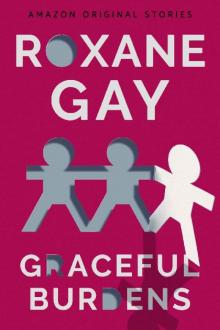 Graceful Burdens (Out of Line collection)
Graceful Burdens (Out of Line collection)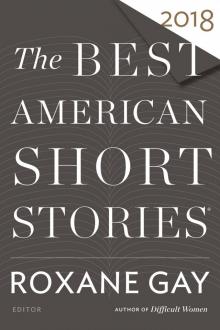 The Best American Short Stories 2018
The Best American Short Stories 2018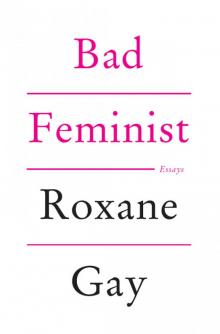 Bad Feminist
Bad Feminist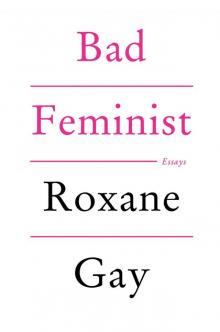 Bad Feminist: Essays
Bad Feminist: Essays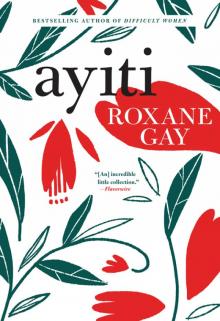 Ayiti
Ayiti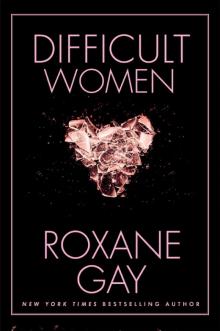 Difficult Women
Difficult Women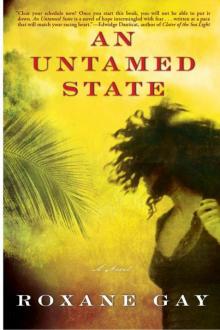 An Untamed State
An Untamed State Hunger
Hunger